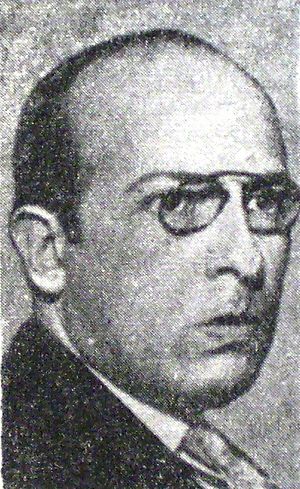Aníbal Ponce facts for kids
Quick facts for kids
Aníbal Ponce
|
|
|---|---|
 |
|
| Born | 6 June 1898 |
| Died | 18 May 1938 (aged 39) |
| Occupation | Psychologist, sociologist, university professor, essayist |
| Political party | Communist Party of Argentina |
Aníbal Norberto Ponce (born June 6, 1898 – died May 18, 1938) was an important Argentine thinker. He was a psychologist, a sociologist, and a university professor. He also worked as a political activist. Ponce wrote many essays and was known for his strong beliefs about education and society.
Contents
Biography
Early Life and Studies
Aníbal Ponce grew up in Buenos Aires, Argentina. He went to the National College of Buenos Aires. Later, he studied philosophy and humanities at the University of Buenos Aires. He even studied medicine for a few years.
University Reform and Early Career
From 1918, Ponce was very active in the Movement for University Reform. This movement aimed to make universities better and more open. In 1920, he met José Ingenieros, another important thinker. They worked together on a magazine called Revista de Filosofía. After Ingenieros passed away in 1925, Ponce took over the magazine.
New Projects and Political Work
In 1930, Ponce started the Free College of Higher Studies. In its publication, Courses and Conferences, he published parts of his important book, "Education and Class Struggle," in 1934. Around this time, he became active in the Communist Party of Argentina. This was a political party that believed in a society where everyone is equal. He also visited the Soviet Union. In 1935, he helped create the Association of Intellectuals, Artists, Journalists and Writers. He was its first leader.
Teaching and Exile
Ponce taught Psychology at several universities in Argentina. In 1936, he was becoming very well-known. However, he lost his job because he supported Marxism. This was a way of thinking about society and fairness. He was also strongly against fascism, which is a type of government that is not democratic.
Because of this, he moved to Mexico. There, he taught psychology, ethics, sociology, and dialectics at different universities. He continued his political work, joining the Mexican League of Revolutionary Writers and Artists. He eventually settled in Morelia, Mexico, and got a permanent teaching job at the Universidad Michoacana de San Nicolás de Hidalgo.
His Death
In 1938, Aníbal Ponce was in a car accident between Morelia and Mexico City. He had internal injuries that were not found in time. He died shortly after the accident.
His Ideas
In Argentina, during the 1920s and 1930s, Ponce wrote many texts about psychology. He focused on how people develop and learn. He also explored topics like thinking, feelings, and how people adapt.
Ponce created his own unique way of thinking. He combined ideas from José Ingenieros, Alfred Adler, Jean Piaget, and Lucien Lévy-Bruhl. Later, he also included ideas from Karl Marx and other Marxists. His book "Education and Class Struggle" looked at history. It explained how the way society is set up (its economy and social classes) has shaped different ways of teaching throughout time.
Works
- Ambición y angustia en los adolescentes
- La vejez de Sarmiento
- Condiciones para la universidad libre
- Humanismo burgués y humanismo proletario: de Erasmo a Romain Rolland
- Educación y lucha de clases
- Estudios de Psicología
See also
 In Spanish: Aníbal Ponce para niños
In Spanish: Aníbal Ponce para niños

